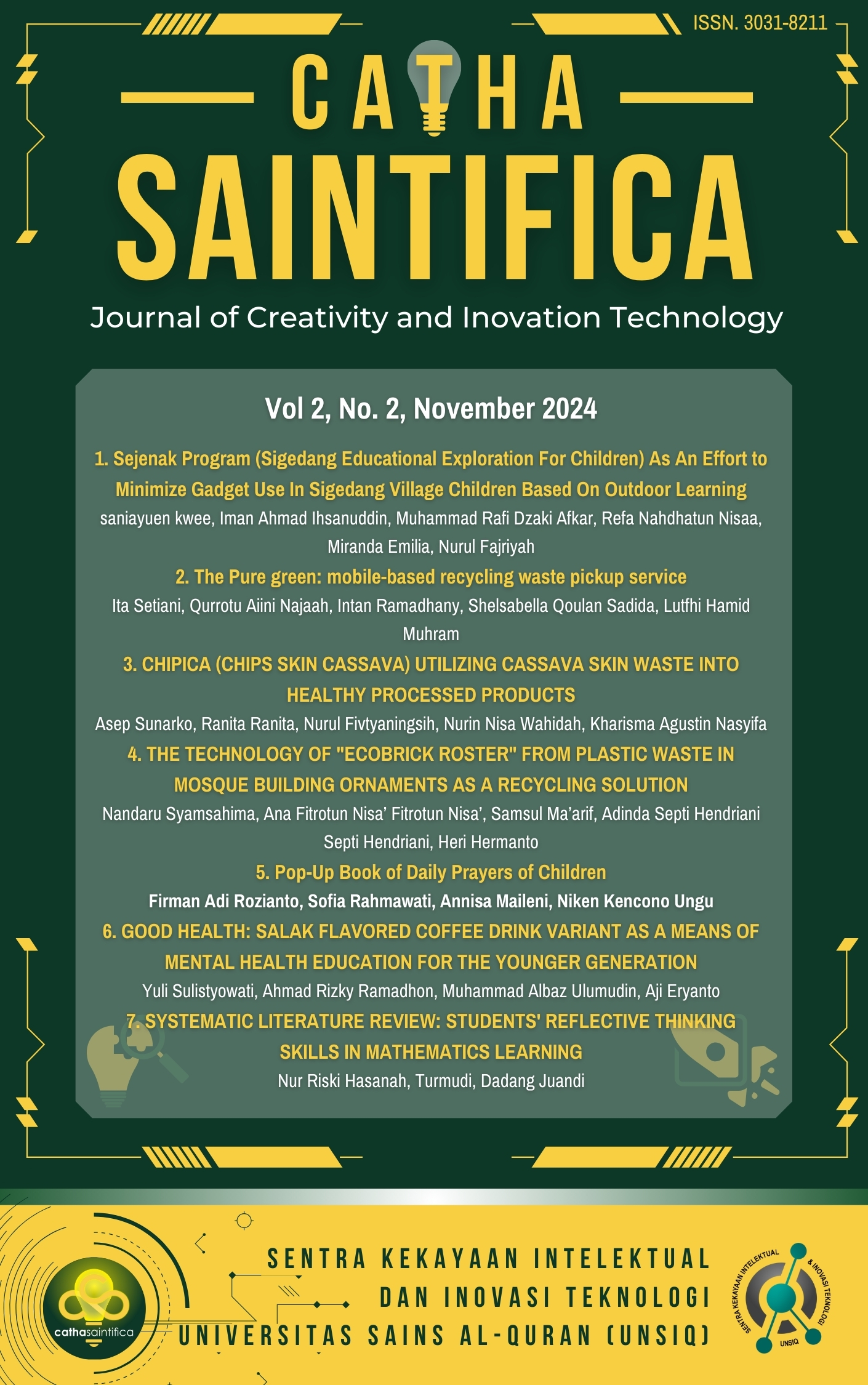SYSTEMATIC LITERATURE REVIEW: STUDENTS' REFLECTIVE THINKING SKILLS IN MATHEMATICS LEARNING
DOI:
https://doi.org/10.32699/cathasaintifica.v2i2.7093Keywords:
Students, Reflective Thinking, Mathematics, Learning, Systematic Literature ReviewAbstract
Students' reflective thinking skills are very important in achieving educational goals. Reflective thinking skills have a big role in the process of solving the problems. The involvement of reflective thinking processes in mathematics learning will influence the achievement of learning outcomes. This research aims to describe the results of research on students' reflective thinking skills in mathematics learning. The method used in this research, namely systematic literature review (SLR) which is guided by the Preferred Reporting Items for Systematic Review and MetaAnalysis (PRISMA). This research has collected information and study results from researchers from all over the world to provide a general overview of research on students' reflective thinking in mathematics learning. The key question in this research is how these articles are distributed based on year of publication, level of education, method, conceptual framework of reflective thinking, levels and indicators of reflective thinking. The results of the research show that studies related to reflective thinking skills in 2017 to 2023 are a period of growth in the publication of articles in reputable international journals, especially in scopus. Research on reflective thinking is mostly carried out at the secondary school level, most studies on reflective thinking apply qualitative methods, it is obtained several levels and indicators in students' reflective thinking and some do not report them. The implications of this research will be reference material that describes students' reflective thinking to improve mathematics learning outcomes.
References
Agustan, S., Juniati, D., & Siswono, T. Y. E. (2017). Reflective thinking in solving an algebra problem: A case study of field independent-prospective teacher. Journal of Physics: Conference Series, 893(1). https://doi.org/10.1088/1742-6596/893/1/012002
Amalia, S. R., & Widodo, A. N. A. (2018). Analisis Kemampuan Pemecahan Masalah Mahasiswa Melalui Model Pbl Berbasis Etnomatematika Ditinjau Dari Kepribadian Topologi Hippocrates Dan Galenus Tipe Cholearis Dan Phlegmantis. AKSIOMA : Jurnal Matematika Dan Pendidikan Matematika, 9(1), 1. https://doi.org/10.26877/aks.v9i1.2467
Boud, D. (1989). The role of self-assessment in student grading. Assessment & Evaluation in Higher Education, 14(1), 20–30. https://doi.org/10.1080/0260293890140103
Duff, A., & Duffy, T. (2002). Psychometric properties of Honey & Mumford’s Learning Styles Questionnaire (LSQ). Personality and Individual Differences, 33(1), 147–163. https://doi.org/https://doi.org/10.1016/S0191-8869(01)00141-6
Gencel, I. E., & Saracaloğlu, A. S. (2018). The Effect of Layered Curriculum on Reflective Thinking and on Self-Directed Learning Readiness of Prospective Teachers. International Journal of Progressive Education, 14(1), 8–20. https://doi.org/10.29329/ijpe.2018.129.2
Gurol, A. (2011). Determining the Reflective Thinking Skills of Pre-Service Teachers in Learning and Teaching Process. Energy Education Science and Technology Part B: Social and Educational Studies, 3(3), 387–402.
Hill, H. C., Ball, D. L., & Schilling, S. G. (2008). Unpacking pedagogical content knowledge: Conceptualizing and measuring teachers’ topic-specific knowledge of students. Journal for Research in Mathematics Education, 39(4), 372–400. https://doi.org/10.5951/jresematheduc.39.4.0372
Hudaini, N., & Lestari, K. E. (2023). Pengaruh Kemampuan Berpikir Reflektif Matematis Terhadap Kemampuan Berpikir Kreatif Matematis Siswa. Didactical Mathematics, 5(2), 413-421. https://doi.org/10.31949/dm.v5i2.6365
Kholid, M. N., Sadijah, C., Hidayanto, E., Permadi, H., & Firdareza, R. M. F. (2020). Pupils’ Reflective Thinking in Solving Linear Equation System Problem. Journal for the Mathematics Education and Teaching Practices, 1(1), 19–27.
Kolb, B. (1984). Functions of the frontal cortex of the rat: A comparative review. Brain Research Reviews, 8(1), 65–98. https://doi.org/10.1016/0165-0173(84)90018-3
Makrygiannis, P. A., Makrygiannis, P. S., Krimpeni, M., & Vrizidis, L. (2014). The role of multi-representational learning environments to achieve instrumental genesis in mathematics. World Transactions on Engineering and Technology Education, 12(3), 495–500.
Nass, C., & Moon, Y. (2000). Machines and mindlessness: Social responses to computers. Journal of Social Issues, 56(1), 81–103. https://doi.org/10.1111/0022-4537.00153
Nisak, Z. (2004). Analisis Swot Untuk Menentukan Strategi Kompetitif. Jurnal Ekonomi Bisnis, 1–8.
Ramadhani, R., & Juandi, D. (2020). An analysis of mathematical reflective thinking skills of senior high school students. Journal of Physics: Conference Series, 1521(3). https://doi.org/10.1088/1742-6596/1521/3/032059
Sholikhin, R., Nur Afifah, D. S., & Maryono, M. (2021). STUDENTS’ REFLECTIVE THINKING IN MATHEMATICAL PROBLEM SOLVING. MaPan, 9(1), 153. https://doi.org/10.24252/mapan.2021v9n1a10
Simacon, P. D. P., & Veloria, E. V. (2022). Reflective Thinking Skills and Attitude towards Problem-solving as Mediated by Mathematical Resilience of the Students. Asian Journal of Education and Social Studies, April, 39–51. https://doi.org/10.9734/ajess/2022/v35i4765
Thapa, S., Nielsen, J. B., Aldahmash, A. M., Qadri, F. R., & Leppin, A. (2021). Willingness to use digital health tools in patient care among health care professionals and students at a University Hospital in Saudi Arabia: Quantitative cross-sectional survey. JMIR Medical Education, 7(1), 1–14. https://doi.org/10.2196/18590
Thurm, D., Vandervieren, E., Moons, F., Drijvers, P., Barzel, B., Klinger, M., van der Ree, H., & Doorman, M. (2023). Distance mathematics education in Flanders, Germany, and the Netherlands during the COVID 19 lockdown—the student perspective. ZDM - Mathematics Education, 55(1), 79–93. https://doi.org/10.1007/s11858-022-01409-8
Xie, Y., Ke, F., & Sharma, P. (2008). The effect of peer feedback for blogging on college students’ reflective learning processes. Internet and Higher Education, 11(1), 18–25. https://doi.org/10.1016/j.iheduc.2007.11.001
Downloads
Published
Issue
Section
License
Authors who publish with this journal agree to the following terms:
- Authors retain copyright and grant the journal right of first publication with the work simultaneously licensed under a Creative Commons Attribution-ShareAlike 4.0 International License that allows others to share the work with an acknowledgement of the work's authorship and initial publication in this journal.
- Authors are able to enter into separate, additional contractual arrangements for the non-exclusive distribution of the journal's published version of the work (e.g., post it to an institutional repository or publish it in a book), with an acknowledgement of its initial publication in this journal.
- Authors are permitted and encouraged to post their work online (e.g., in institutional repositories or on their website) prior to and during the submission process, as it can lead to productive exchanges, as well as earlier and greater citation of published work (See The Effect of Open Access).


.png)
_(1).png)
.png)
.png)
1.png)
.png)
.png)
